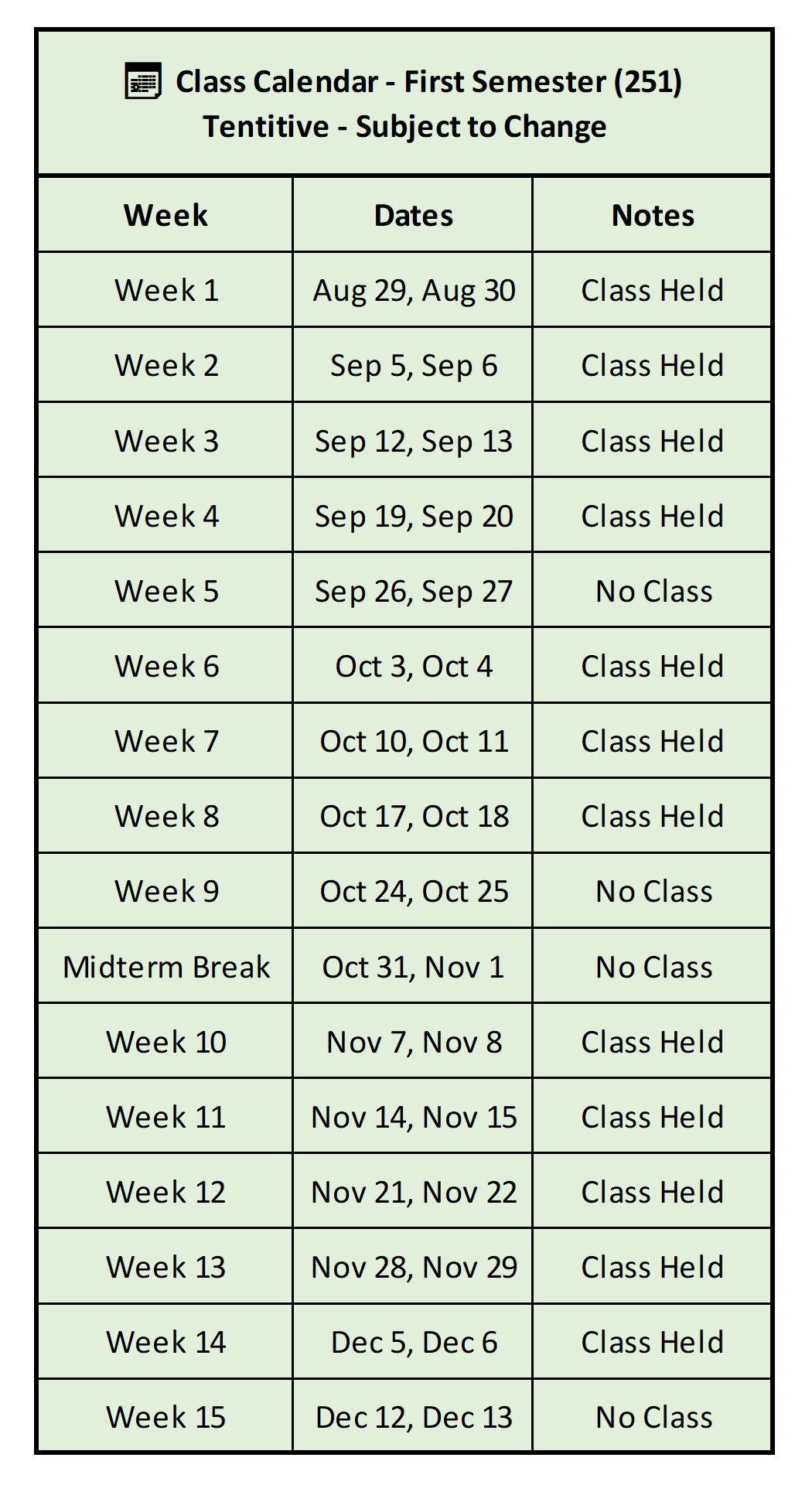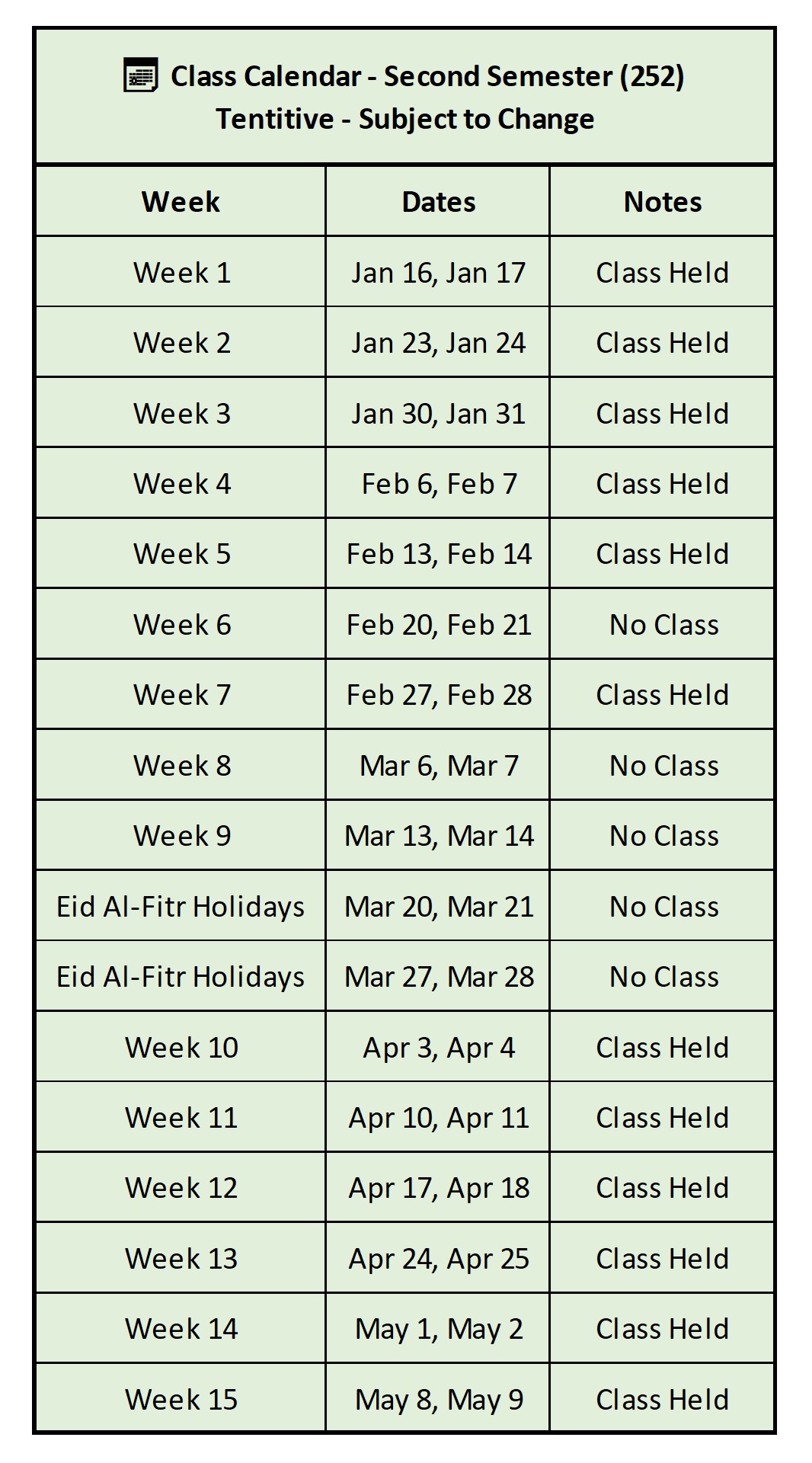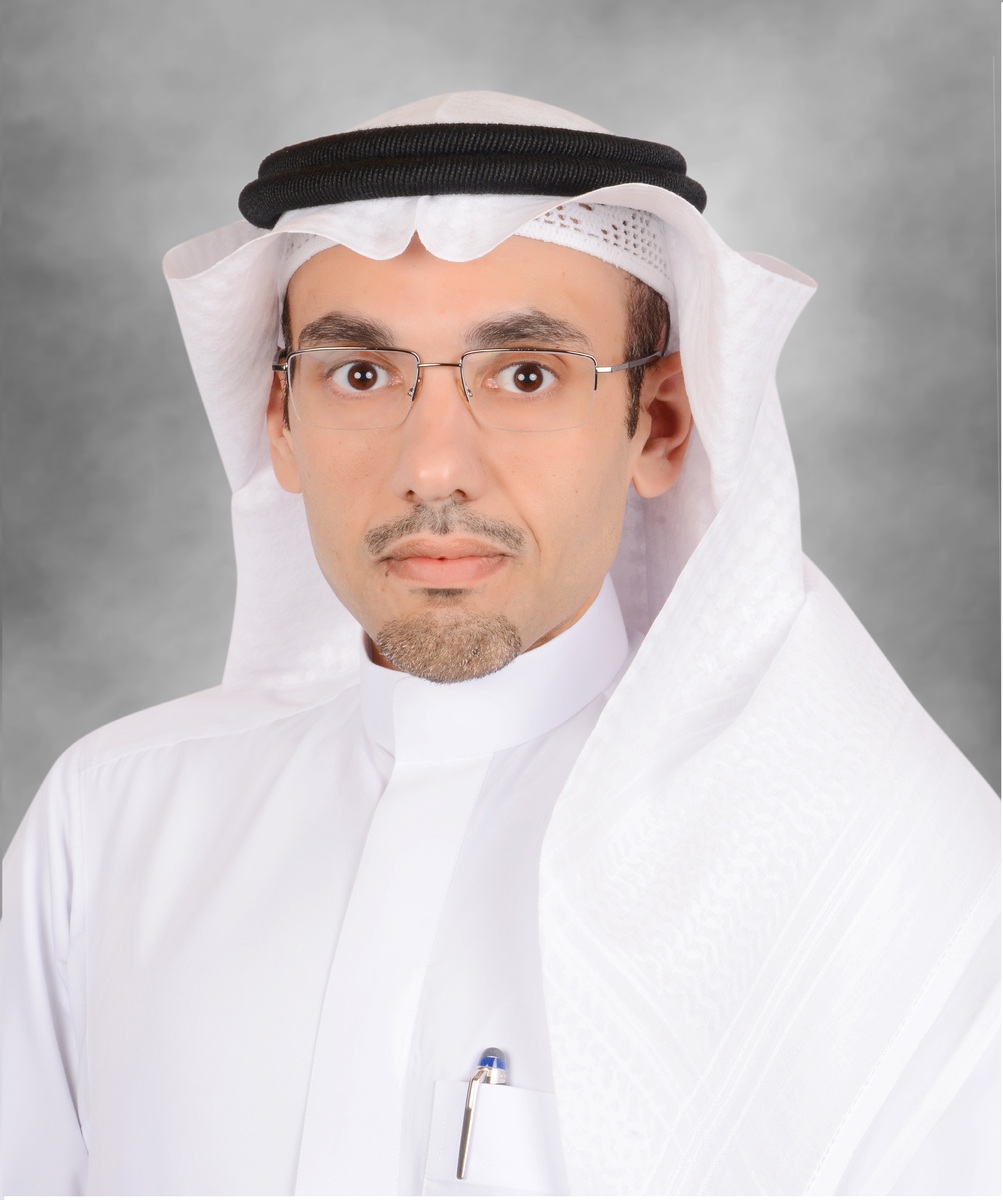The Master of Engineering Program in Sustainable and Renewable Energy builds on the success of KFUPM's undergraduate education with its emphasis on research and study of advanced and specialized subjects. The general objective of the program is to prepare professionals and leaders with the skills required to address the challenges of transforming the Kingdom's electric energy sector into a highly efficient, reliable entity. The program graduates will have acquired state-of-the-art knowledge, critical thinking, and problem-solving skills to address the technical, economic and environmental issues in the design of renewable and sustainable energy systems. Moreover, the graduates will have attained the methodical attributes to operate, control, evaluate, and manage the renewable and sustainable energy systems of the future. Hence, they will advance and lead the Kingdom's renewable and sustainable electric energy sector into a highly efficient, reliable entity.
The general objective of the program is to prepare professionals and leaders with the knowledge, skills, and competence required to address the challenges of transforming the Kingdom's electric energy sector into a highly efficient, sustainable and reliable entity. The specific objectives are:
- The graduates will have acquired state-of-the-art knowledge, critical thinking, and problem-solving skills to address the technical, economic and environmental issues in the design of renewable and sustainable energy systems.
- The graduates will have attained the methodical attributes to operate, control, evaluate, and manage the renewable and sustainable energy systems of the future.
- The graduates will advance and lead the Kingdom's renewable and sustainable electric energy sector into a highly efficient, reliable entity.
Duration, Timeline, and Delivery Format
KFUPM understands that many engineers would enroll in this program on a part-time basis and would only be able to attend lectures during after-hours sessions. Consequently, the duration of the program and delivery format are influenced by this.
- The program will be delivered during the weekends (Fridays and Saturdays).
- Each cohort will have twenty-four months to complete all courses, including the project.
- Each course would be covered over 45 contact hours.
- The courses are taught by faculty from various departments and by invited speakers from industry and academia.
- The program starts annually in the Fall semester only.
Degree Plan for Master of Engineering Program in Sustainable and Renewable Energy
Conferment of a Master of Engineering in "Sustainable and Renewable Energy" requires successful completion of 30 credit hours of graduate level courses and a written graduation project. The project will be directed by industrial and academic advisors. The degree plan spans four semesters over a period of 24 months.
In summary, the course work is distributed as follows:
- 18 credit hours of core courses
- 9 credit hours of technical elective courses
- 3 credit hours for Project (SEN 600)
| Course | Title | LT | LB | CR |
|---|---|---|---|---|
| First Semester | ||||
| SEN 540 | Electric Energy Systems | 3 | 0 | 3 |
| SEN 541 | Sustainable and Renewable Energy Systems | 3 | 0 | 3 |
| SEN 542 | Advanced Energy Conversion | 3 | 0 | 3 |
| 9 | 0 | 9 | ||
| Second Semester | ||||
| SEN 543 | Renewable Energy Integration | 3 | 0 | 3 |
| SEN 544 | Solar Photovoltaic Systems | 3 | 0 | 3 |
| SEN 545 | Energy Economics, Policies, and Regulations. | 3 | 0 | 3 |
| 9 | 0 | 9 | ||
| Third Semester | ||||
| SEN XXX | Elective 1 | 3 | 0 | 3 |
| SEN 600 | Sustainable and Renewable Energy Project | 0 | 0 | 3 |
| 3 | 0 | 6 | ||
| Fourth Semester | ||||
| SEN XXX | Elective 2 | 3 | 0 | 3 |
| SEN XXX | Elective 3 | 3 | 0 | 3 |
| 6 | 0 | 6 | ||
| Total Credit Hours | 30 | |||
Core Courses:
- SEN 540: Electric Energy Systems.
- SEN 541: Sustainable and Renewable Energy Systems.
- SEN 542: Advanced Energy Conversion.
- SEN 543: Renewable Energy Integration.
- SEN 544: Solar Photovoltaic Systems.
- SEN 545: Energy Economics, Policies, and Regulations.
Elective Courses:
- SEN 550: Electricity Markets
- SEN 551: Nuclear Engineering
- SEN 552: Solar Thermal Energy
- SEN 553: Wind Energy Engineering
- SEN 554: Smart Grids
- SEN 555: Energy Efficiency
- SEN 556: Energy Storage
- SEN 557: Sustainable Buildings and Cities
- SEN 558: Energy Project Management & Leadership
- SEN 590: Special Topics in Sustainable and Renewable Energy
- SEN 591: Special Topics in Sustainable and Renewable Energy
Course Description
SEN 540
Electric Energy Systems (3-0-3)
Fundamentals of power systems. The power grid in KSA. Electricity markets. Quality and reliability of power systems. Modeling of power grid components. Basics of optimization and computational techniques. Per-unit analysis. Load flow analysis. Fault studies. Transient stability analysis. Operation and planning of power systems. Frequency regulation and automatic generation control. Security and contingency analysis. Power system monitoring and state estimation.
Prerequisite:
- Graduate Standing.
SEN 541
Sustainable and Renewable Energy Systems (3-0-3)
Fundamentals of Sustainable and Renewable Energy Systems. Energy outlook and the environment. Global warming and fossil fuels. Solar energy systems. Wind energy systems. AC-DC converters. Batteries and charge controllers. Techno-economic analysis of sustainable and renewable energy systems.
Prerequisite:
- Graduate Standing.
SEN 542
Advanced Energy Conversion (3-0-3)
Fundamentals of thermodynamics as applied to energy conversion systems. Conventional and renewable sources of energy. Analysis of conventional and renewable technologies for generating electricity with emphasis on performance and environmental impact. Renewable electrical power generation will include concentrated solar power generation, photovoltaic and geothermal energy. Basic principles of fuel cells and carbon capture. Different forms of energy storage, optimal source utilization and life cycle analysis.
Prerequisite:
- Graduate Standing
SEN 543
Renewable Energy Integration (3-0-3)
Modeling of renewable sources. Characteristics of renewable generation. Power system analysis of bulk power grids with integrated renewable sources. Operational challenges with high renewable penetrations. Mathematical models of power system planning considering renewable resources. Uncertainties representation of renewable resources. The impact of inverter-based generation on bulk power system dynamics and short-circuit performance. Integration impact of renewable power plants in the generation and transmission expansion planning.
Prerequisite:
- SEN 540: Electric Energy Systems.
- SEN 541: Sustainable and Renewable Energy Systems.
SEN 544
Solar Photovoltaic Systems (3-0-3)
Photovoltaic system characteristics. Modeling and prediction of PV module energy yield. Building-integrated photovoltaics. Stand-alone photovoltaic systems. System design and operation of large-scale photovoltaic power plants. Environmental impact of PV systems.
Prerequisite:
- SEN 541: Sustainable and Renewable Energy Systems.
SEN 545
Energy Economics, Policies, and Regulations (3-0-3)
Fundamentals of microeconomics. Energy demand, supply, markets, and public policies affecting energy markets. Aspects related to oil and natural gas, electricity, nuclear power, and renewable sectors. Energy regulation and taxing, energy efficiency, and policies for emission control. Subsidies and tariffs.
Prerequisite:
- Graduate Standing.
SEN 550
Electricity Markets (3-0-3)
Principles, structure, and design of deregulated electricity markets. Perfect and imperfect competition. Strategies for conventional and renewable participants in electricity markets. Network considerations, transmission congestion, locational marginal prices, and ancillary services. Market regulations and policies for sustainable electricity supply. Generation and transmission planning in a deregulated market environment.
Prerequisite:
- Graduate Standing.
SEN 551
Nuclear Engineering (3-0-3)
Reactor physics and technology. Nuclear power plant theory. Design principles. Thermal hydraulics. Nuclear fuel cycle. Integration of nuclear energy into energy systems. Operation and control. Safety and reliability. Nuclear power plant equipment and performance. Economics and environmental issues. Nuclear fuel management. Nuclear techniques in medicine and industry, and advanced topics in nuclear engineering.
Prerequisite:
- SEN 542: Advanced Energy Conversion.
SEN 552
Solar Thermal Energy (3-0-3)
Design consideration of various concentrating collectors for thermal and photovoltaic applications. Solar thermal/electric power conservation. Solar thermal energy storage. Solar thermal design methods: chart utilizability. Solar space conditioning design and computer simulation models such as TRNSYS. Economic considerations. Solar desalination and other applications. Design projects in selected areas.
Prerequisite:
- SEN 541: Sustainable and Renewable Energy Systems.
- SEN 542: Advanced Energy Conversion.
SEN 553
Wind Energy Engineering (3-0-3)
Introduction of meteorological aspects. Basic meteorological measurements. Characteristics of wind parameters. Wind power resource assessment. Wind turbine technology and power. Mechanical aspects. Control and protection. Wind turbine generator models. Integrated wind power aspects.
Prerequisite:
- SEN 541: Sustainable and Renewable Energy Systems.
SEN 554
Smart Grids (3-0-3)
Fundamentals of smart grids including definitions, technology, architecture and design criteria. Distributed generation systems. Smart grid technologies and their applications. Operation and planning of future power distribution networks. Smart metering. Demand side management. Distribution automation equipment. Electric vehicles. Main components of a microgrid. Grid-connected and islanded modes of microgrids. DC and AC microgrids. Structure of microgrids. Centralized and decentralized microgrid controllers.
Prerequisite:
- Graduate Standing.
SEN 555
Energy efficiency (3-0-3)
Fundamental energy concepts. Load characterization. Utility rates and potential identification of efficiency enhancement. Scientific background of lighting. Heating and air-conditioning systems. Energy conservation codes. Standards and constraints. Investigating the economic, regulatory and infrastructure factors. Energy management strategies. Design techniques to minimize the energy consumption of building architectural, mechanical and electrical systems.
Prerequisite:
- Graduate Standing.
SEN 556
Energy Storage (3-0-3)
Renewable power integration issues. Need for energy storage. Principles and technologies. Energy storage systems. Distributed storage. Modeling and control of battery energy storage systems. Super capacitors. Fuel cells. Flywheels. Pumped hydroelectric storage. Hybrid energy storage systems. Power control and management. Storage sizing methodologies. Degradation and losses. Optimal operation and performance indices. Storage for electric vehicles and applications of energy storage. Cost analysis. Future of energy storage.
Prerequisite:
- Graduate Standing.
SEN 557
Sustainable Buildings and Cities (3-0-3)
Ecologically sustainable strategy, designing for sustainable buildings and cities, regulatory environment, green building rating, material selection, indoor environmental quality (air, light, and noise), water treatment & efficiency systems, ventilation systems, building economics, and staff productivity. Transportation planning processes, use of optimization techniques in transportation. Water Resources and Environmental Engineering. Evaluation of wastewater treatment plants. Applications of system engineering techniques to water and environmental problems.
Prerequisite:
- Graduate Standing.
SEN 558
Energy Project Management & Leadership (3-0-3)
Fundamentals of project management. Technical, economic, and policy considerations related to achieving a profitable reduction in fossil fuels. Specific characteristics of energy projects from the planning point of view. Energy conservation. Energy data collection, recording, processing and analysis. Statistical analysis. Building the project framework. Components of the project plan. Project scope statement and its importance. Utilizing the Work Breakdown Structure and the project schedule. Components of schedule development. Energy management and audit. Risk management techniques. Stakeholders, their roles and responsibilities. Effective project leaders. Computer applications as tools in energy management.
Prerequisite:
- Graduate Standing.
SEN 590
Special Topics in Sustainable and Renewable Energy
The contents of this course will be in one of the areas of renewable and sustainable energy systems. The specific contents of the special topics course will be given in detail at least one semester in advance of that in which it is offered.
Prerequisite:
- Consent of the Instructor.
SEN 591
Special Topics in Sustainable and Renewable Energy
The contents of this course will be in one of the areas of renewable and sustainable energy systems. The specific contents of the special topics course will be given in detail at least one semester in advance of that in which it is offered.
Prerequisite:
- Consent of the Instructor.
SEN 600
Sustainable and Renewable Energy Project (0-0-3)
This course gives the students an opportunity to complete a project related to the sustainable and renewable engineering program. Apply knowledge gained during the previous semesters and practice a variety of skills such as researching for technical information, organization, planning, looking up sources, designing and testing, and delivering oral and written presentations. Graded on a pass or fail basis.
Prerequisite:
- Graduate Standing.
- Only open to the Master of Engineering in Sustainable Energy students.


Admission
To apply to the program, candidates must have a bachelor's degree in engineering from a recognized institution with a high academic reputation. The minimum requirements for possible admission are as below:
- The program is open to males and females.
- A Bachelor (B.Sc.) Degree in engineering from a recognized institution.
- A Grade-Point Average (GPA) of 2.5 or higher on a scale of 4.00 or equivalent. Official transcripts and degree certificates are required for final admission.
- Completion of TOEFL with a minimum score of 520 (PBT), 190 (CBT), or 68 (IBT). IELTS is also acceptable (minimum band-6.0).
- At least two letters of recommendation, where one letter can be from industry.
- A short introductory video (no longer than 2 minutes) in English that briefly introduces you and highlights your motivation and reasons for applying to the program.
- Passing an admission interview.
Notes:
- Satisfying the minimum admission requirements does not guarantee admission into the program, as final admission is subject to an evaluation of the entire application, and the admission interview.
- Based on the assessment of the applicant file and the admission interview, the admission committee might offer conditional acceptance for students who need to take deficiency courses.
- This program is self-sponsored. It does not provide scholarships funded by KFUPM.
Mandatory documents for application (without which the application will not be processed):
- Copy of identification (National ID for Saudi nationals / Passport for international applicants/ Iqama for residents of Saudi Arabia).
- Complete official transcripts for the B.Sc. degree.
- Statement-of-Purpose (a one-page essay focusing on career and research goals).
- Short introductory video, maximum 2 minutes, addressing who you are and why you are applying to this program.
- Two Recommendation Letters.
- Proof of English proficiency.
- CV.
Program Schedule and Fee
Duration
- 2 Years.
LANGUAGE
- English.
TUITION FEES
- SAR 90,000+VAT.
- (SAR 45,000+VAT / Year).
LOCATION
- Dhahran, Saudi Arabia.
APPLICATION OPENS FOR FALL 2025
- January 04, 2026.
DEADLINE FOR SUBMITTING APPLICATIONS
- March 31, 2026.
PROGRAM START DATE
- August 2026.
Contact Information

Dr. Fahad Al-Ismail (Program Coordinator)
Email: fsalismail@kfupm.edu.sa
Building 59 Room 2090
